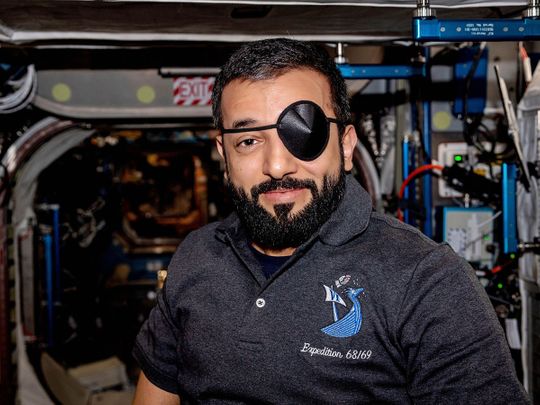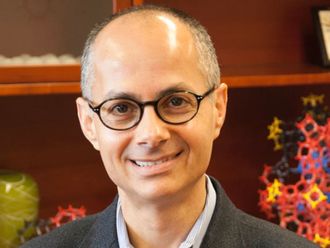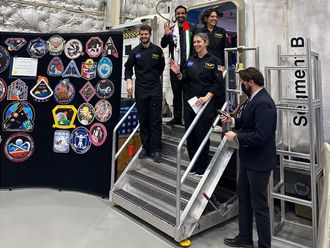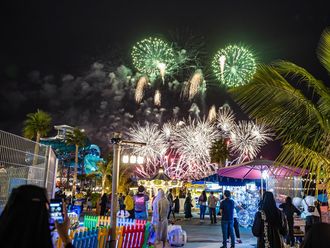
Dubai: UAE astronaut Sultan Al Neyadi, who is on the longest Arab space mission on the International Space Station (ISS), today shared photos of himself wearing an eyepatch that looks like the one worn by pirates.
In the text accompanying the photos in the social media post, Al Neyadi explained the eyepatch’s significance in space exploration missions. His post indicated that he wore the eyepatch as part of a research on how fluid shifts in the body can exert pressure on the eyes, potentially leading to vision problems during long-duration space missions.
The ‘Sultan of Space’ stated: “On the ISS, fluids in our body shift toward the head, which may exert pressure on eyes, leading to vision problems. Using an Optical Coherence Tomography [OCT)] I am capturing images of the retina to understand how microgravity affects our eyes during long duration missions.”
also read
What is SANS?
By conducting these examinations, US Space Agency NASA aims to deepen our understanding of the effects of microgravity on the eyes.
Microgravity environments, such as those experienced on the ISS, can cause a redistribution of bodily fluids, leading to a phenomenon known as Spaceflight-Associated Neuro-ocular Syndrome (SANS).
SANS has been observed in some astronauts and is characterised by vision impairments that can persist even after their return to Earth.
The advanced imaging technique using OCT allows for detailed examination of the retina, enabling researchers to identify any structural or functional alterations caused by the prolonged exposure to weightlessness.
The findings from such studies can help in developing preventive measures to mitigate the impact of microgravity on vision and ensure long-term success of human space exploration.
Speaking to students
Meanwhile, addressing students in Ajman during a ham radio session on Tuesday, Al Neyadi emphasised the UAE’s commitment to environmental conservation and its alignment with space exploration goals.
In response to a student’s question about how the UAE’s focus on environmental conservation aligns with its space exploration goals, Al Neyadi answered: “It is important to protect our planet. The UAE, along with its partners, is working to advance technologies that help sustain life on Earth. Our work on the International Space Station reflects our commitment to protecting our planet. Additionally, the UAE is hosting COP28 later this year, which demonstrates our dedication to the cause of environmental protection.”
The Mohammed Bin Rashid Space Centre (MBRSC), the agency behind the UAE Astronaut Programme, organised the ham radio session at the Mushairif School, Cycle 1-Ajyal in Ajman, in collaboration with the Emirates Amateur Radio Society (EARS) and Emirates Literature Foundation (ELF).
Ham radio, or amateur radio, uses a broad spectrum of frequencies to communicate between individuals, groups, and even remote regions and space, making it a valuable communication tool.
The ham radio session, the fourth in a series of 10, was held as the ISS passed over the region, with 25 students from various classes participating. The session is part of the ELF in Space initiative, between MBRSC and Emirates Literature Foundation, which aims to bring space closer to the community.
The session commenced with an introduction to MBRSC and its endeavours, followed by a presentation about space stations, offering attendees a glimpse into mankind’s exploits in space. Additionally, students received training on the usage of ham radio, simplifying details about the essential communication device that has been in use since the 20th century.
This was followed by the live ham radio session lasting 10 minutes with astronaut Al Neyadi. Participants from different classes had the opportunity to ask Al Neyadi a variety of space-related questions, such as the training required for space missions, how UAE culture influences work on the ISS, the importance of international collaboration in space exploration, future plans after returning to Earth, and how going to space changes one’s perspective, among others.
‘Call from Space’ in Ajman
Al Neyadi is scheduled to address a larger group of Ajman residents in a live video call from space on Wednesday.
MBRSC, in collaboration with General Secretariat of the Executive Council in Ajman, will hold the next edition of ‘A Call from Space’ in Ajman on June 21. The engaging event featuring the Emirati astronaut will mark the seventh instalment in the series.
As part of the roadshow, residents of Ajman will have the unique opportunity to connect live with Al Neyadi.
The event will be held at Emirates Hall in Ajman from 2 pm on Wednesday. Doors will open at 12:40 PM and close at 1:50 PM. Owing to limited seating, those interested have been urged to secure their attendance at the earliest by visiting the MBRSC website.
More than 6,500 people have taken part in the past six editions of the event, giving attendees a glimpse in to Al Neyadi’s life on the ISS and the opportunity to speak with him.
The UAE Astronaut Programme is one of the projects managed by MBRSC under the UAE’s National Space Programme and funded by the ICT Fund of the Telecommunications and Digital Government Regulatory Authority (TDRA), which aims to support research and development in the ICT sector in the UAE and promote the country’s integration on the global stage.










